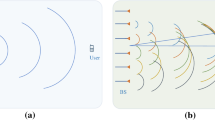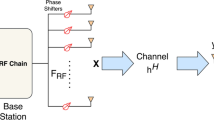Abstract
Beamforming (BF) architecture is a key task for the next deades communication systems and also is an developing approach for large-scale antenna arrays. The proposed approach in fully connected analog phase-shifter is millimeter wave transmission suited BF architecture with CSI (channel state information) and limited radio frequency chains. DL (Deep learning) is a vigorous approach for signal identification and channel estimation into wireless communications. Hence, the proposed the DL-allowed BFNN (beamforming neural network) which can be designed to optimize the multi user massive mimo system to get higher Spectral Efficiency. Simulation results shows the proposed beamforming neural network acts on consequential perform high robustness and gain to imperfect CSI.The BFNN proposed enormously decreas the computational complexity hardby 0.18 millions Floating Point Operations (FLOPs) accomplished 0.28 millions floating point operations by conventional beamforming algorithms.










Similar content being viewed by others
Data availability
Data sharing is not applicable to this article as no datasets were generated or analyzed during the current study.
Code Availability
Code is available, and can be shared upon request.
References
El Ayach, O., Rajagopal, S., Abu-Surra, S., Pi, Z., & Heath, R. W. (2014). Spatially sparse precoding in millimeter wave MIMO systems. IEEE Transactions on Wireless Communications, 13(3), 1499–1513.
Alkhateeb, A., El Ayach, O., Leus, G., & Heath, R. W. (2014). Channel estimation and hybrid precoding for millimeter wave cellular systems. IEEE Journal of Selected Topics in Signal Processing, 8(5), 831–846.
Lin, T., Cong, J., Zhu, Y., Zhang, J., & Letaief, K. B. (2019). Hybrid beamforming for millimeter wave systems using the MMSE criterion. IEEE Transactions on Communications, 67(5), 3693–3708.
Yu, X., Shen, J. C., Zhang, J., & Letaief, K. B. (2016). Alternating minimization algorithms for hybrid precoding in millimeter wave MIMO systems. IEEE Journal of Selected Topics in Signal Processing, 10(3), 485–500.
Sohrabi, F., & Yu, W. (2016). Hybrid digital and analog beamforming design for large-scale antenna arrays. IEEE Journal of Selected Topics in Signal Processing, 10(3), 501–513.
Ye, H., Li, G. Y., & Juang, B.-H. (2017). Power of deep learning for channel estimation and signal detection in OFDM systems. IEEE Wireless Communications Letters, 7(1), 114–117.
Wang, Y., Gui, G., Ohtsuki, T., & Adachi, F. (2021). Multi-task learning for generalized automatic modulation classification under non-gaussian noise with varying snr conditions. IEEE Transactions on Wireless Communications, 20(6), 3587–3596.
Dörner, S., Cammerer, S., Hoydis, J., & Ten Brink, S. (2017). Deep learning based communication over the air. IEEE Journal of Selected Topics in Signal Processing, 12(1), 132–143.
Nguyen, T. Q., et al. (2001). A correlation coefficient approach for evaluation of stiffness degradation of beams under moving load. Science, 296(5565), 79–92.
Huang, H., Song, Y., Yang, J., Gui, G., & Adachi, F. (2019). Deep-learning-based millimeter-wave massive MIMO for hybrid precoding. IEEE Transactions on Vehicular Technology, 68(3), 3027–3032.
Alkhateeb, A., Alex, S., Varkey, P., Li, Y., Qu, Q., & Tujkovic, D. (2018). Deep learning coordinated beamforming for highly-mobile millimeter wave systems. IEEE Access, 6, 37328–37348.
Chen, J., Feng, W., Xing, J., Yang, P., Sobelman, G. E., Lin, D., & Li, S. (2020). Hybrid beamforming/combining for millimeter wave MIMO: A machine learning approach. IEEE Transactions on Vehicular Technology, 69(10), 11353–11368.
Lavdas, S., Gkonis, P. K., Zinonos, Z., Trakadas, P., Sarakis, L., & Papadopoulos, K. (2022). A machine learning adaptive beamforming framework for 5g millimeter wave massive MIMO multicellular networks. IEEE Access, 10, 91597–91609.
Gao, X., Dai, L., Han, S., Chih-Lin, I., & Wang, X. (2017). Reliable beamspace channel estimation for millimeter-wave massive MIMO systems with lens antenna array. IEEE Transactions on Wireless Communications, 16(9), 6010–6021.
Mohamed, E. M., Hashima, S., Hatano, K., Kasban, H., & Rihan, M. (2020). Millimeter-wave concurrent beamforming: A multi-player multi-armed bandit approach. Computers, Materials and Continua, 65(3), 1987–2007.
Huang, H., Peng, Y., Yang, J., Xia, W., & Gui, G. (2019). Fast beamforming design via deep learning. IEEE Transactions on Vehicular Technology, 69(1), 1065–1069.
Goodfellow, I., Bengio, Y., & Courville, A. (2016). Deep learning. Cambridge: MIT Press.
Souto, N., Silva, J., Pavia, J., & Ribeiro, M. (2019). An alternating direction algorithm for hybrid precoding and combining in millimeter wave MIMO systems. Physical Communication, 34, 165–173.
Funding
This paper does not get funds from any funding agency, institute, or company.
Author information
Authors and Affiliations
Corresponding author
Ethics declarations
Conflict of interest
1. All authors have participated in (a) conception and design, or analysis and interpretation of the data; (b) drafting the article or revising it critically for important intellectual content; and (c) approval of the final version. 2. This manuscript has not been submitted to, nor is under review at, another journal or other publishing venue. 3. Authors have no Conflict of interest.
Ethical approval
Followed the ethics of research. This manuscript has not been submitted to, nor is under review at, another journal or other publishing venue.
Additional information
Publisher's Note
Springer Nature remains neutral with regard to jurisdictional claims in published maps and institutional affiliations.
Rights and permissions
Springer Nature or its licensor (e.g. a society or other partner) holds exclusive rights to this article under a publishing agreement with the author(s) or other rightsholder(s); author self-archiving of the accepted manuscript version of this article is solely governed by the terms of such publishing agreement and applicable law.
About this article
Cite this article
Thurpati, S., Mudavath, M. & Muthuchidambaranathan, P. Design of Hybrid Beamforming for Multiuser MIMO mmWave Systems Using Deep Learning. Wireless Pers Commun 135, 1747–1760 (2024). https://doi.org/10.1007/s11277-024-11159-3
Accepted:
Published:
Issue Date:
DOI: https://doi.org/10.1007/s11277-024-11159-3




